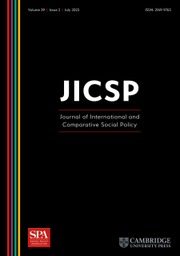Article contents
‘Framing social policy and populism in a changing European context’
Published online by Cambridge University Press: 09 March 2020
Extract
This themed section focuses on the political and social policy discourses of resurgent welfare chauvinism and identity politics in contemporary Europe. The populist radical right, in particular, has utilised these discourses to great effect, reframing social policy and social citizenship through a heady mix of arguments evoking the nation state and ethnicity, often contemporaneously. Although the explanations for the outcome of the referendum on the withdrawal of the United Kingdom from the European Union, or Brexit, cannot be distilled to any single issue or cause, it is also impossible to deny the relevance of social policy to the outcome. For example, vote choice in the referendum was influenced by factors such as education levels and levels of labour market vulnerability (Hobolt, 2016), ultimately dovetailing with the well-known thesis about globalisation's ‘winners’ and ‘losers’ (Kitschelt & McGann, 1995; Mudde, 2007; Rydgren, 2007; Kriesi et al., 2012) and the structural failures of post-industrial economies to stop growing inequality.
- Type
- Introduction
- Information
- Copyright
- Copyright © 2018 Informa UK Limited, trading as Taylor & Francis Group
References
- 2
- Cited by




